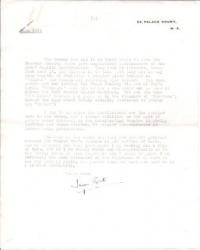
Signed copies of two long Typed Letters from James Agate to Montague Shearman, regarding the 'Controversy' surrounding Noel Coward's 1931 play 'Cavalcade', forwarded with two covering notes by Agate's secretary Alan 'Jock' Dent to E. F. Gye.
A total of 8 pp, 4to, all on Palace Court letterheads. Dent's notes both signed 'Jock Dent.', and the copies both signed 'James Agate'. Two important, energetic and vivid letters by Agate, totalling 6 pp, 4to, defending Coward's play and his position on 'the intellectual and the popular', against the 'pseudo-intelligentsia' of the barristers Shearman and 'Jack' St John Hutchinson (1884-1942). As Item Two states below, Agate has instructed Dent to send the copies to Gye as he was present at his 'talk' with Shearman on 4 November, and because of Shearman's respect for his 'opinion in all matters of taste'. Good, on aged paper. ONE: Dent to Gye, 5 November 1931. 1 p, 4to. 'Mr. Agate has asked me to forward to you this copy of a letter which he has just posted to Mr. Shearman.' TWO: Copy of Agate to Shearman, 5 November 1931. 2 pp, 4to. Headed 'FINAL MANIFESTO'. Begins 'I may as well out with the whole truth, which is this. | The gravamen of my charge against the class which you and Hutchinson represent is that it does not go to those things which are really highbrow. [...] it is absurd to argue that any art of drama can exist for, say six people. [...] That class if it really supported the theatre would have kept "Hamlet" on at the Queen's, and made it possible for Huxley's "World of Light" to run more than three weeks to empty houses. It would have flocked to see "The Venetian" and Jean Forbes-Robertson's Hedda Gabler.' Complains that he has 'stood up for these plays in print and in front of the microphone', and that there is 'no case of any first-class intellectual play' which he has 'condemned or neglected or failed to encourage. Now comes a popular play which I assess according to its merits as a popular entertainment, and Hutchy's lot have the impertinence to condemn this play on the plea that it does not belong to the intellectual drama which actually they do not support'. 'The Hutchy lot had it in their power to save the Phoenix Society [...] They took no interest, never went near it, and allowed it to die. [...] Yet you run down "Cavalcade" because you judge it by the standard of "Socrates" [by Clifford Bax], though the play which Hutchy actually professed to prefer was "Hamlet"! [...] I try to appraise the intellectual and the popular each in its class, [...] You told me the other day that you had the greatest respect for Ernest Gye's opinion in all matters of taste, and as he heard our talk last night I am sending him a copy of this'. References to John Gielgud, 'Jean Forbes-Robertson's Hilda Wangel', 'The Miracle', Duff Cooper, the Stage Society. THREE: Dent to Gye, 6 November 1931. 1 p, 4to. 'I enclose another copy of another letter in the Cavalcade Controversy.' FOUR: Copy of Agate to Shearman, 6 November 1931. 4 pp, 4to. With three minor emendations in Agate's autograph. 'This is the Late Night Final and positive last. [...] I do not like that class which, having the means, lets the Phoenix die, ignores Dekker at the Old Vic because it isn't fashionable, frequents the opera in May but will not keep it going at any other time, ignores Jean as Hedda, affects good plays only when its pets are performing, and has failed to make possible the existence in London of an intellectual theatre. The fact that you individually have taken Tim Dawes to one or two plays does not alter the fact that the class as a whole has failed in its responsibility.' 'The kind of play that this class professes to want in place of "Cavalcade" [...] would reduce Drury Lane to bankruptcy.' Gives reason why he and Ivor Brown uphold Coward's play. Quotes 'Hutchy's letter'. 'I do not lay claim to Hutchy's intellect. But I challenge him as a super-intelligent playgower to produce one single instance of any first-class work in the theatre of the last ten years which I have failed to acclaim, except Pirandello's "Henry IV" which I regarded as charlatanism and gave my reasons.' Again defends Cavalcade and his endorsement of it. 'Have you now got the point which is my objection to being told that in being truly critical about "Cavalcade" I am giving proof of inferior intellectuality?' Concludes 'The attitude is really pseudo-intelligentsia and for that "Bloomsbury and Chelsea" is, when broadcasting or writing articles, convenient shorthand.'


